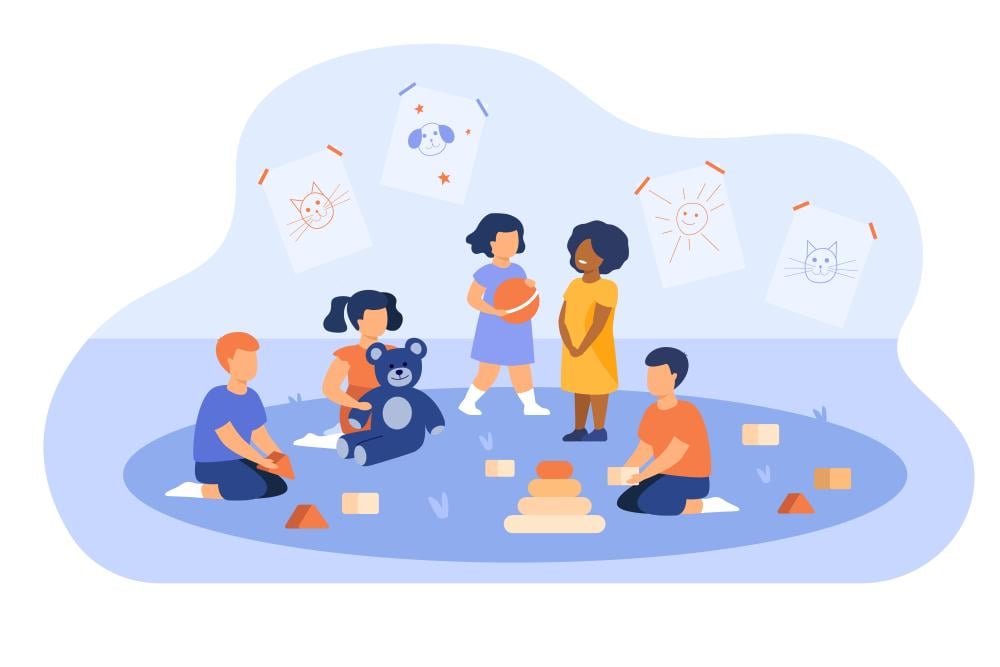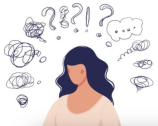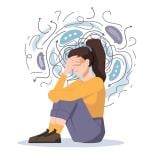ADHD: Common Signs in Children and Teens and the Connection with Anxiety
ADHD: Common Signs in Children and Teens and the Connection with Anxiety

What is ADHD?
Attention-deficit/hyperactivity disorder (ADHD) is a lifelong neurodevelopmental disorder that is estimated to impact 7 million children between the ages of 3 and 17.
Since ADHD symptoms differ from person to person, it’s important to understand common signs. At the most basic level, ADHD symptoms fall into three content themes or subtypes:
- Inattention: Difficulty sustaining attention, easily distracted, may lose track of items or conversations.
- Hyperactivity: Difficulty remaining still, appearing to be driven by a motor. Many describe feeling a need to be “busy/on the go” and uncomfortable being still for long stretches of time.
- Impulsivity: Difficulty waiting, may interrupt others. At the OCD Center, we notice kids/teens diagnosed with ADHD tend to disregard their surroundings as a source of information to inform their decisions (proactively). There are multiple reasons why this can happen. For some, it may be out of worry, like, “If I don’t tell you now, I will forget later,” while others could describe it as an urge to “say the thing” or “do the thing.” When kids/teens engage in frequent impulsive decisions/behaviors, it can have significant ripple effects on them socially, emotionally, academically, and more.
ADHD diagnosis
Many people may be wondering, “Don’t most kids have an impulsive or forgetful moment from time to time?” Yes, they do. While many ADHD symptoms may resemble typical behaviors of children and teens during learning, an important difference is the frequency (how often are behaviors/symptoms occurring?) and severity (are they occurring in multiple settings?). Many times, teachers will be the first to identify symptoms, as the school environment can prove to be challenging for kids suspected of having ADHD. It’s important to communicate with your child’s teacher(s) if you suspect ADHD to compare what you’re seeing at home with what they’re seeing at school. While teachers are unable to formally diagnose ADHD, this collaboration will assist parents in collecting essential information to determine whether a formal evaluation is necessary.
ADHD and Anxiety
For those diagnosed with ADHD, an estimated 4 in 10 children also have clinically significant anxiety. But what does this mean and what can it look like in a child or teen?
It’s important to understand that the following examples, on their own, aren’t likely to cause a clinically significant anxiety concern. Many people, with or without ADHD, experience similar challenges. Instead, assume the examples are patterns of behavior. Another important consideration is intention. People with ADHD tend to have good intentions and want to succeed. Untreated ADHD can create major barriers. It's not about lacking the desire to succeed but rather missing the necessary skills.
Academically
ADHD’s effect on processing and working memory can make school harder, often leading to the false belief, “I'm not smart enough. I’m not going to get far in life.”
- For a child who struggles with inattention, time management challenges can lead to anxiety of running late and being the last one in the classroom because the teacher will call them out again, or their tardiness could result in a detention.
- A child who struggles with organization has trouble finding what they need when they need it. They can forget their calculator for math class and feel anxious knowing they can’t go back and get it.
- A child who struggles to sit still for long stretches of time and/or sustain attention on the lesson may impulsively blurt out “funny” comments in class to “lighten the mood.” The intention is to be funny, but they missed that this wasn’t the right time, which may lead to redirection or consequences.
Each example, when occurring frequently throughout the day or week, can provoke symptoms of anxiety.
Socially
For kids who struggle with impulse control, they may say something on social media that sounded “good” in their heads. They think they crushed it, but aren’t getting a response fast enough, or maybe, don’t get the response that they thought they would. This can lead to anxious worrying of, “What did I do?” “Are they mad?”
Another common example is impulsively saying something in the moment that they later regret because they didn’t slow down and think through whether it’s the right time or the right place.
Both situations, especially when occurring frequently due to lacking skills, can foster anxiety. All they want is to fit in. Kids may want to avoid returning to school and their social circle due to fear of being judged and their anxiety.
Emotionally
For the person who isn’t diagnosed with ADHD, they’re enduring years of struggling. Many kids aren’t diagnosed until middle school age or later, especially those with primary inattentive symptoms. I hear from teens in our care all the time, “If I just try harder or if I was just smarter.” There’s a lot of negative self-talk that can really get going, like, “Why do I always mess it up? I’m so stupid. Maybe I’m just a bad person.” The older they get, the more time this narrative can be reinforced despite their best efforts.
This can increase the risk of:
- Low self-esteem.
- Academic/social underachievement (possible school/social avoidance).
- Stimulation-seeking behaviors. Kids with unmanaged hyperactivity have energy and want to do things. Combined with unmanaged impulse control challenges it could lead to potentially unsafe or higher risk behaviors.
What can parents and caregivers do?
There are six things I recommend parents and caregivers do:
- Identify concerns. Are you noticing any symptoms that might resemble ADHD?
- Find out whether there’s a family history of ADHD. There’s a definite genetic component to it.
- Talk to your child’s teacher(s). Share what you see at home and ask if they’re seeing the same things.
- Talk with your child’s pediatrician and ask what steps you should take next.
- Ask your pediatrician about assessments. There are several basic measures that can be given to teachers and parents to complete that can assist providers in gathering enough information to more confidently diagnose ADHD.
- Help your child/teen practice mindfulness. Ed Hallowell, MD, one of the leading experts in ADHD, describes it as “having a Ferrari engine with bicycle breaks.” There's just so much going on internally that it's very hard to be present. Mindfulness can help kids slow down their bodies and minds to try and stay more in the here and now.
Treatment for ADHD
Medication management has proven to be extremely beneficial in treating ADHD. It can take some time to find the right medication, though many teens describe finding the right medication as though “someone gave me the remote to the television for the first time.” It’s as if they now have more power to decide what “channel” (content) to attend to and can more readily “change the channel,” switch to another task, when needing to.
Cognitive Behavioral Therapy (CBT) is a great partner with medication management. Medication can help people with ADHD be in charge of their “TV remote,” or what they choose to focus on. The person still needs to develop the tools to make the responsible decision to “change the channel” from video games to homework, for example. CBT assists people in strengthening executive functioning skills that tend to be underdeveloped in those newly diagnosed with ADHD. CBT specifically helps in identifying negative thinking patterns and provides skills to reframe the way a person feels about themselves and their ability to succeed.
Overall, combining medication with teaching skills is a very safe and effective approach to help kids slow down and filter through information with more confidence.
Embracing a growth mindset with ADHD
I want to encourage parents or caregivers reading this that it's not a bad thing if you’re noticing symptoms of ADHD. Everyone has their own strengths and areas of opportunity. Kids want to achieve. The earlier someone understands how their brain works and receives coaching, like through CBT to build up those areas of opportunity, the more confident and effective they will feel navigating life.
This blog was written in collaboration with Rogers Behavioral Health, an ADAA partner.




















